Unilever HRM Report: Recruitment, Culture, and Retention Analysis
VerifiedAdded on 2023/06/13
|10
|3176
|83
Report
AI Summary
This report provides a detailed analysis of Human Resource Management (HRM) practices at Unilever, focusing on recruitment, motivation, and retention processes. It critically appraises Unilever's strategies in these areas, highlighting how they relate to the company's corporate strategy and culture. The report explores the recruitment process, emphasizing Unilever's focus on skilled workforce and talent acquisition, and discusses various motivation techniques, including achievement and power motivation, used to enhance employee productivity. Furthermore, it examines the challenges faced by Unilever in employee retention, training, and managing a diverse culture, including attracting the right candidates, engaging qualified employees, and addressing issues related to employee interest in training programs. The impact of HRM activities on Unilever's corporate culture and strategies is also analyzed, emphasizing the importance of aligning HRM practices with the company's overall goals. Desklib offers this report as a resource for students studying HRM, along with a wide range of solved assignments and past papers.
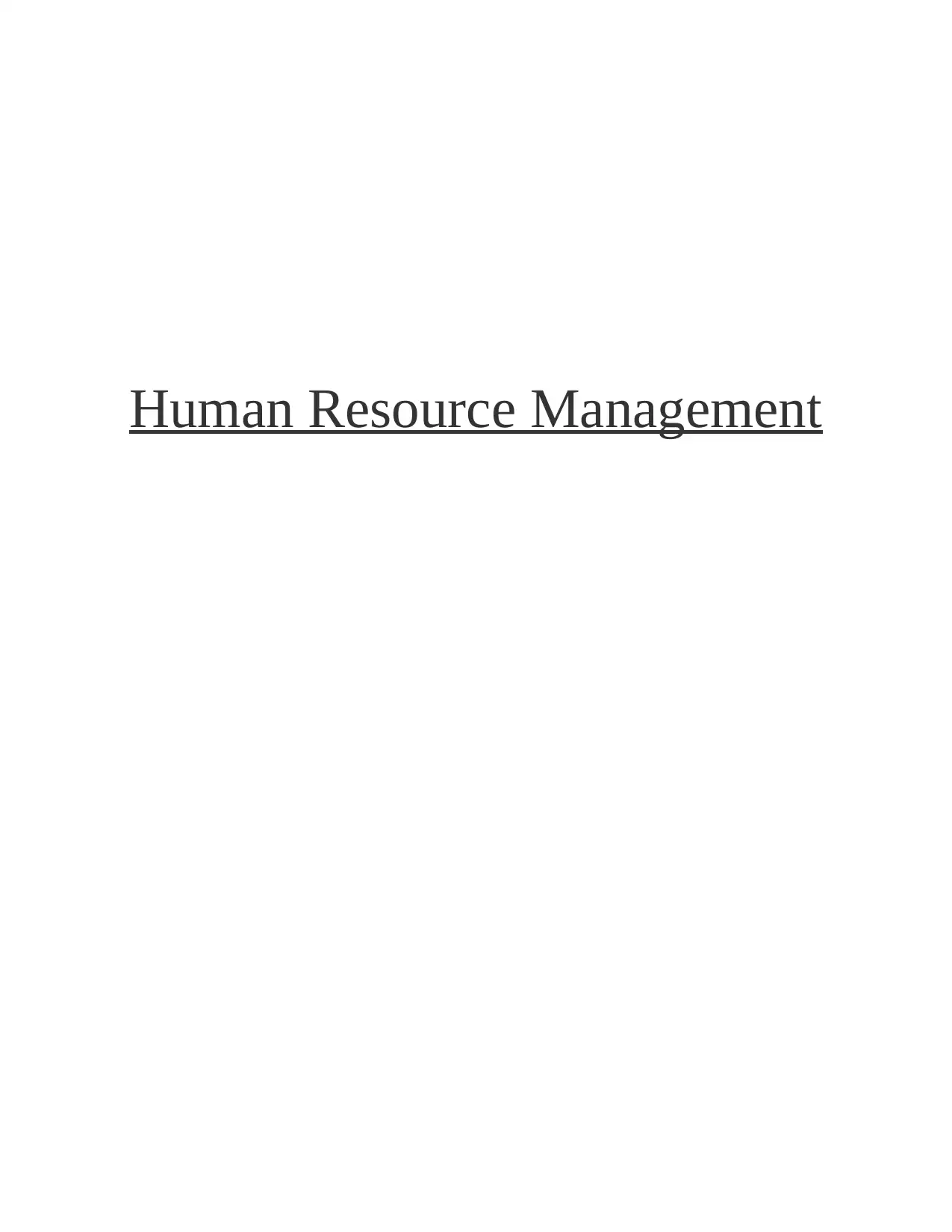
Human Resource Management
Paraphrase This Document
Need a fresh take? Get an instant paraphrase of this document with our AI Paraphraser
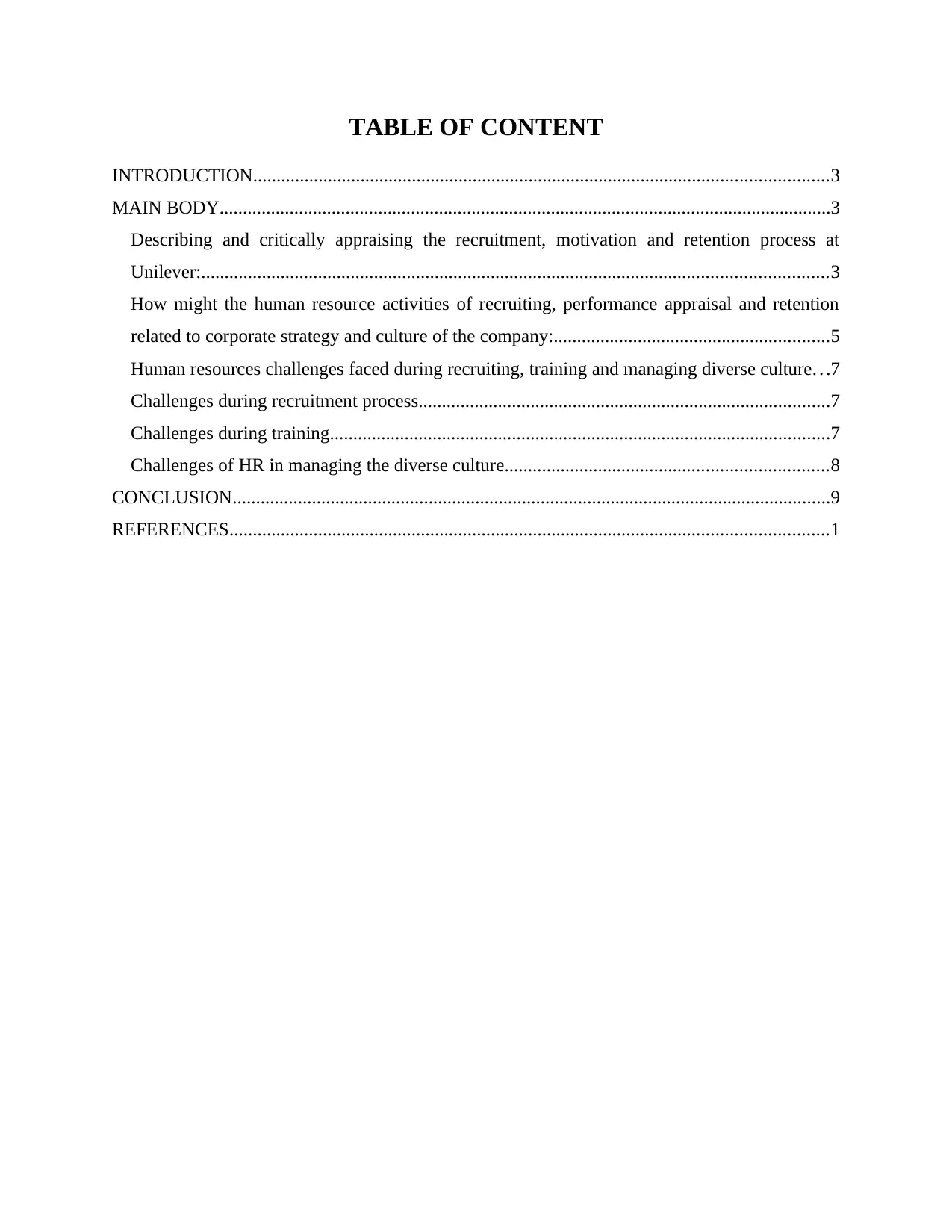
TABLE OF CONTENT
INTRODUCTION...........................................................................................................................3
MAIN BODY...................................................................................................................................3
Describing and critically appraising the recruitment, motivation and retention process at
Unilever:......................................................................................................................................3
How might the human resource activities of recruiting, performance appraisal and retention
related to corporate strategy and culture of the company:...........................................................5
Human resources challenges faced during recruiting, training and managing diverse culture. . .7
Challenges during recruitment process........................................................................................7
Challenges during training...........................................................................................................7
Challenges of HR in managing the diverse culture.....................................................................8
CONCLUSION................................................................................................................................9
REFERENCES................................................................................................................................1
INTRODUCTION...........................................................................................................................3
MAIN BODY...................................................................................................................................3
Describing and critically appraising the recruitment, motivation and retention process at
Unilever:......................................................................................................................................3
How might the human resource activities of recruiting, performance appraisal and retention
related to corporate strategy and culture of the company:...........................................................5
Human resources challenges faced during recruiting, training and managing diverse culture. . .7
Challenges during recruitment process........................................................................................7
Challenges during training...........................................................................................................7
Challenges of HR in managing the diverse culture.....................................................................8
CONCLUSION................................................................................................................................9
REFERENCES................................................................................................................................1
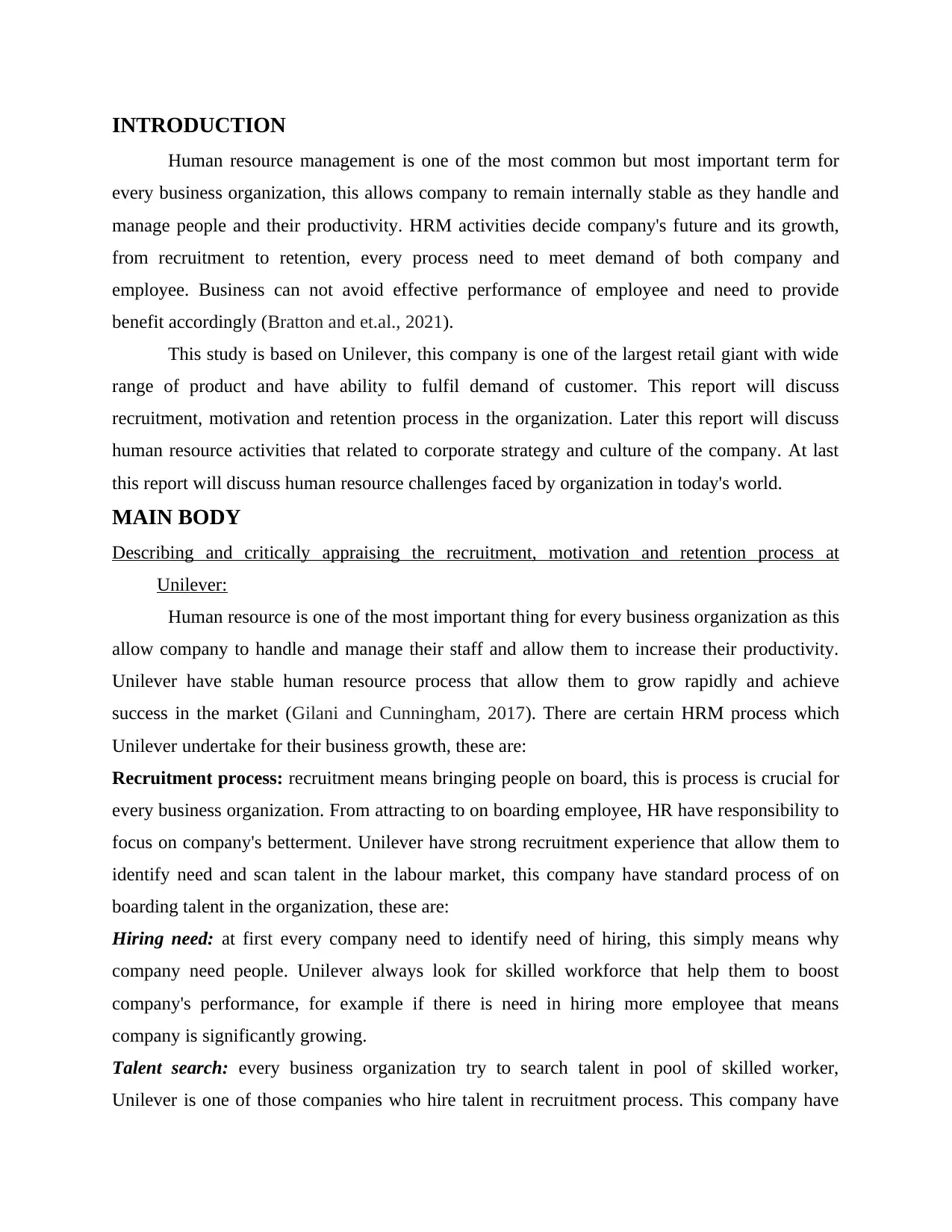
INTRODUCTION
Human resource management is one of the most common but most important term for
every business organization, this allows company to remain internally stable as they handle and
manage people and their productivity. HRM activities decide company's future and its growth,
from recruitment to retention, every process need to meet demand of both company and
employee. Business can not avoid effective performance of employee and need to provide
benefit accordingly (Bratton and et.al., 2021).
This study is based on Unilever, this company is one of the largest retail giant with wide
range of product and have ability to fulfil demand of customer. This report will discuss
recruitment, motivation and retention process in the organization. Later this report will discuss
human resource activities that related to corporate strategy and culture of the company. At last
this report will discuss human resource challenges faced by organization in today's world.
MAIN BODY
Describing and critically appraising the recruitment, motivation and retention process at
Unilever:
Human resource is one of the most important thing for every business organization as this
allow company to handle and manage their staff and allow them to increase their productivity.
Unilever have stable human resource process that allow them to grow rapidly and achieve
success in the market (Gilani and Cunningham, 2017). There are certain HRM process which
Unilever undertake for their business growth, these are:
Recruitment process: recruitment means bringing people on board, this is process is crucial for
every business organization. From attracting to on boarding employee, HR have responsibility to
focus on company's betterment. Unilever have strong recruitment experience that allow them to
identify need and scan talent in the labour market, this company have standard process of on
boarding talent in the organization, these are:
Hiring need: at first every company need to identify need of hiring, this simply means why
company need people. Unilever always look for skilled workforce that help them to boost
company's performance, for example if there is need in hiring more employee that means
company is significantly growing.
Talent search: every business organization try to search talent in pool of skilled worker,
Unilever is one of those companies who hire talent in recruitment process. This company have
Human resource management is one of the most common but most important term for
every business organization, this allows company to remain internally stable as they handle and
manage people and their productivity. HRM activities decide company's future and its growth,
from recruitment to retention, every process need to meet demand of both company and
employee. Business can not avoid effective performance of employee and need to provide
benefit accordingly (Bratton and et.al., 2021).
This study is based on Unilever, this company is one of the largest retail giant with wide
range of product and have ability to fulfil demand of customer. This report will discuss
recruitment, motivation and retention process in the organization. Later this report will discuss
human resource activities that related to corporate strategy and culture of the company. At last
this report will discuss human resource challenges faced by organization in today's world.
MAIN BODY
Describing and critically appraising the recruitment, motivation and retention process at
Unilever:
Human resource is one of the most important thing for every business organization as this
allow company to handle and manage their staff and allow them to increase their productivity.
Unilever have stable human resource process that allow them to grow rapidly and achieve
success in the market (Gilani and Cunningham, 2017). There are certain HRM process which
Unilever undertake for their business growth, these are:
Recruitment process: recruitment means bringing people on board, this is process is crucial for
every business organization. From attracting to on boarding employee, HR have responsibility to
focus on company's betterment. Unilever have strong recruitment experience that allow them to
identify need and scan talent in the labour market, this company have standard process of on
boarding talent in the organization, these are:
Hiring need: at first every company need to identify need of hiring, this simply means why
company need people. Unilever always look for skilled workforce that help them to boost
company's performance, for example if there is need in hiring more employee that means
company is significantly growing.
Talent search: every business organization try to search talent in pool of skilled worker,
Unilever is one of those companies who hire talent in recruitment process. This company have
⊘ This is a preview!⊘
Do you want full access?
Subscribe today to unlock all pages.

Trusted by 1+ million students worldwide
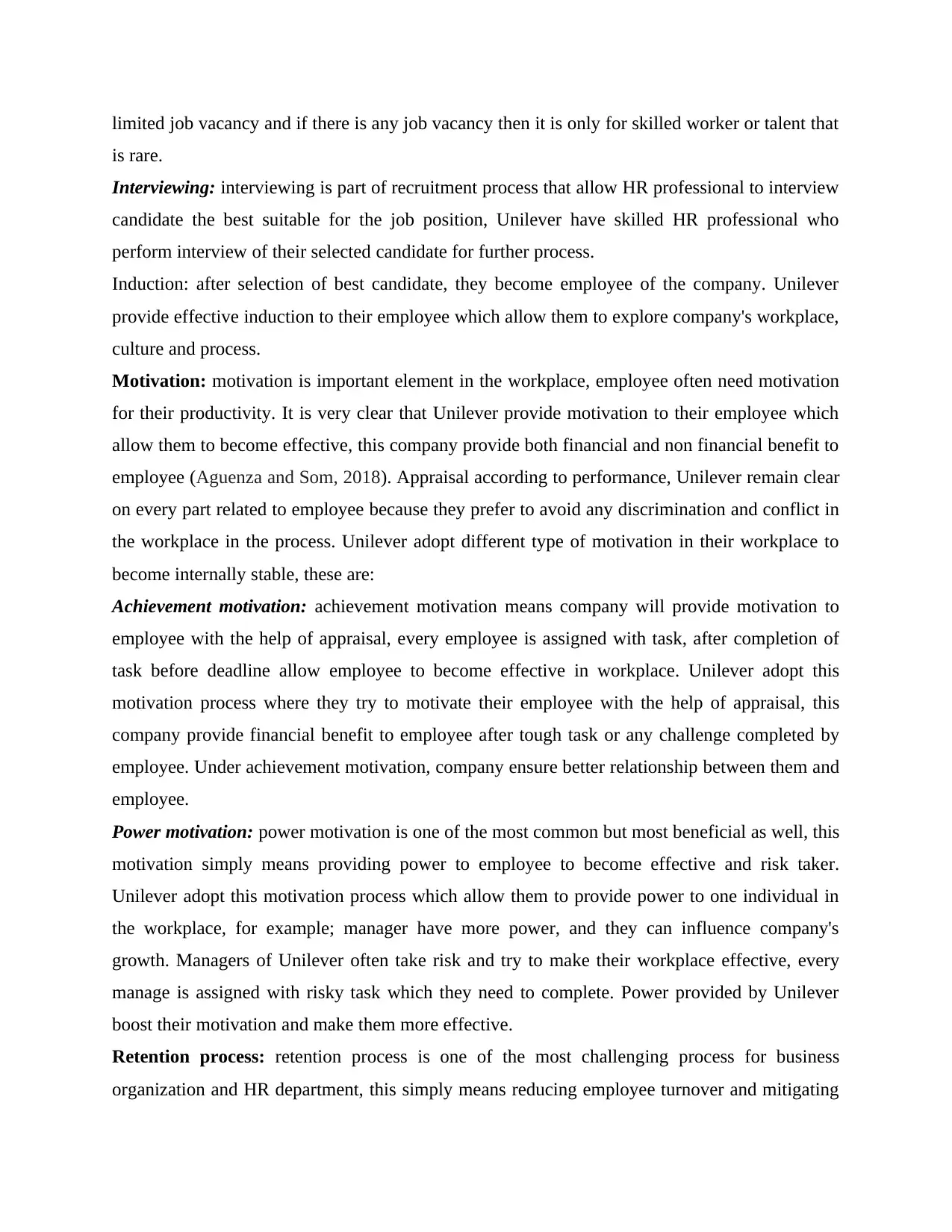
limited job vacancy and if there is any job vacancy then it is only for skilled worker or talent that
is rare.
Interviewing: interviewing is part of recruitment process that allow HR professional to interview
candidate the best suitable for the job position, Unilever have skilled HR professional who
perform interview of their selected candidate for further process.
Induction: after selection of best candidate, they become employee of the company. Unilever
provide effective induction to their employee which allow them to explore company's workplace,
culture and process.
Motivation: motivation is important element in the workplace, employee often need motivation
for their productivity. It is very clear that Unilever provide motivation to their employee which
allow them to become effective, this company provide both financial and non financial benefit to
employee (Aguenza and Som, 2018). Appraisal according to performance, Unilever remain clear
on every part related to employee because they prefer to avoid any discrimination and conflict in
the workplace in the process. Unilever adopt different type of motivation in their workplace to
become internally stable, these are:
Achievement motivation: achievement motivation means company will provide motivation to
employee with the help of appraisal, every employee is assigned with task, after completion of
task before deadline allow employee to become effective in workplace. Unilever adopt this
motivation process where they try to motivate their employee with the help of appraisal, this
company provide financial benefit to employee after tough task or any challenge completed by
employee. Under achievement motivation, company ensure better relationship between them and
employee.
Power motivation: power motivation is one of the most common but most beneficial as well, this
motivation simply means providing power to employee to become effective and risk taker.
Unilever adopt this motivation process which allow them to provide power to one individual in
the workplace, for example; manager have more power, and they can influence company's
growth. Managers of Unilever often take risk and try to make their workplace effective, every
manage is assigned with risky task which they need to complete. Power provided by Unilever
boost their motivation and make them more effective.
Retention process: retention process is one of the most challenging process for business
organization and HR department, this simply means reducing employee turnover and mitigating
is rare.
Interviewing: interviewing is part of recruitment process that allow HR professional to interview
candidate the best suitable for the job position, Unilever have skilled HR professional who
perform interview of their selected candidate for further process.
Induction: after selection of best candidate, they become employee of the company. Unilever
provide effective induction to their employee which allow them to explore company's workplace,
culture and process.
Motivation: motivation is important element in the workplace, employee often need motivation
for their productivity. It is very clear that Unilever provide motivation to their employee which
allow them to become effective, this company provide both financial and non financial benefit to
employee (Aguenza and Som, 2018). Appraisal according to performance, Unilever remain clear
on every part related to employee because they prefer to avoid any discrimination and conflict in
the workplace in the process. Unilever adopt different type of motivation in their workplace to
become internally stable, these are:
Achievement motivation: achievement motivation means company will provide motivation to
employee with the help of appraisal, every employee is assigned with task, after completion of
task before deadline allow employee to become effective in workplace. Unilever adopt this
motivation process where they try to motivate their employee with the help of appraisal, this
company provide financial benefit to employee after tough task or any challenge completed by
employee. Under achievement motivation, company ensure better relationship between them and
employee.
Power motivation: power motivation is one of the most common but most beneficial as well, this
motivation simply means providing power to employee to become effective and risk taker.
Unilever adopt this motivation process which allow them to provide power to one individual in
the workplace, for example; manager have more power, and they can influence company's
growth. Managers of Unilever often take risk and try to make their workplace effective, every
manage is assigned with risky task which they need to complete. Power provided by Unilever
boost their motivation and make them more effective.
Retention process: retention process is one of the most challenging process for business
organization and HR department, this simply means reducing employee turnover and mitigating
Paraphrase This Document
Need a fresh take? Get an instant paraphrase of this document with our AI Paraphraser
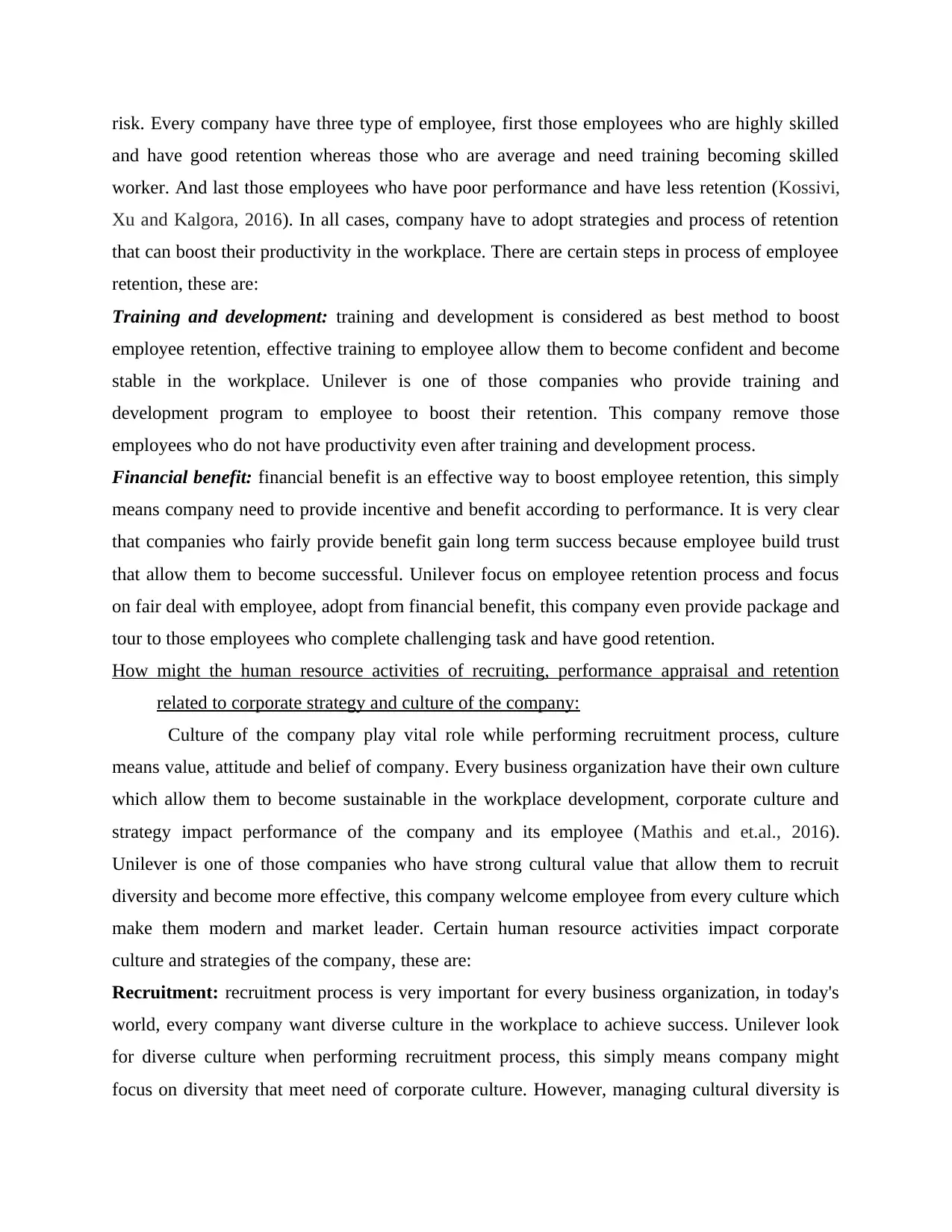
risk. Every company have three type of employee, first those employees who are highly skilled
and have good retention whereas those who are average and need training becoming skilled
worker. And last those employees who have poor performance and have less retention (Kossivi,
Xu and Kalgora, 2016). In all cases, company have to adopt strategies and process of retention
that can boost their productivity in the workplace. There are certain steps in process of employee
retention, these are:
Training and development: training and development is considered as best method to boost
employee retention, effective training to employee allow them to become confident and become
stable in the workplace. Unilever is one of those companies who provide training and
development program to employee to boost their retention. This company remove those
employees who do not have productivity even after training and development process.
Financial benefit: financial benefit is an effective way to boost employee retention, this simply
means company need to provide incentive and benefit according to performance. It is very clear
that companies who fairly provide benefit gain long term success because employee build trust
that allow them to become successful. Unilever focus on employee retention process and focus
on fair deal with employee, adopt from financial benefit, this company even provide package and
tour to those employees who complete challenging task and have good retention.
How might the human resource activities of recruiting, performance appraisal and retention
related to corporate strategy and culture of the company:
Culture of the company play vital role while performing recruitment process, culture
means value, attitude and belief of company. Every business organization have their own culture
which allow them to become sustainable in the workplace development, corporate culture and
strategy impact performance of the company and its employee (Mathis and et.al., 2016).
Unilever is one of those companies who have strong cultural value that allow them to recruit
diversity and become more effective, this company welcome employee from every culture which
make them modern and market leader. Certain human resource activities impact corporate
culture and strategies of the company, these are:
Recruitment: recruitment process is very important for every business organization, in today's
world, every company want diverse culture in the workplace to achieve success. Unilever look
for diverse culture when performing recruitment process, this simply means company might
focus on diversity that meet need of corporate culture. However, managing cultural diversity is
and have good retention whereas those who are average and need training becoming skilled
worker. And last those employees who have poor performance and have less retention (Kossivi,
Xu and Kalgora, 2016). In all cases, company have to adopt strategies and process of retention
that can boost their productivity in the workplace. There are certain steps in process of employee
retention, these are:
Training and development: training and development is considered as best method to boost
employee retention, effective training to employee allow them to become confident and become
stable in the workplace. Unilever is one of those companies who provide training and
development program to employee to boost their retention. This company remove those
employees who do not have productivity even after training and development process.
Financial benefit: financial benefit is an effective way to boost employee retention, this simply
means company need to provide incentive and benefit according to performance. It is very clear
that companies who fairly provide benefit gain long term success because employee build trust
that allow them to become successful. Unilever focus on employee retention process and focus
on fair deal with employee, adopt from financial benefit, this company even provide package and
tour to those employees who complete challenging task and have good retention.
How might the human resource activities of recruiting, performance appraisal and retention
related to corporate strategy and culture of the company:
Culture of the company play vital role while performing recruitment process, culture
means value, attitude and belief of company. Every business organization have their own culture
which allow them to become sustainable in the workplace development, corporate culture and
strategy impact performance of the company and its employee (Mathis and et.al., 2016).
Unilever is one of those companies who have strong cultural value that allow them to recruit
diversity and become more effective, this company welcome employee from every culture which
make them modern and market leader. Certain human resource activities impact corporate
culture and strategies of the company, these are:
Recruitment: recruitment process is very important for every business organization, in today's
world, every company want diverse culture in the workplace to achieve success. Unilever look
for diverse culture when performing recruitment process, this simply means company might
focus on diversity that meet need of corporate culture. However, managing cultural diversity is
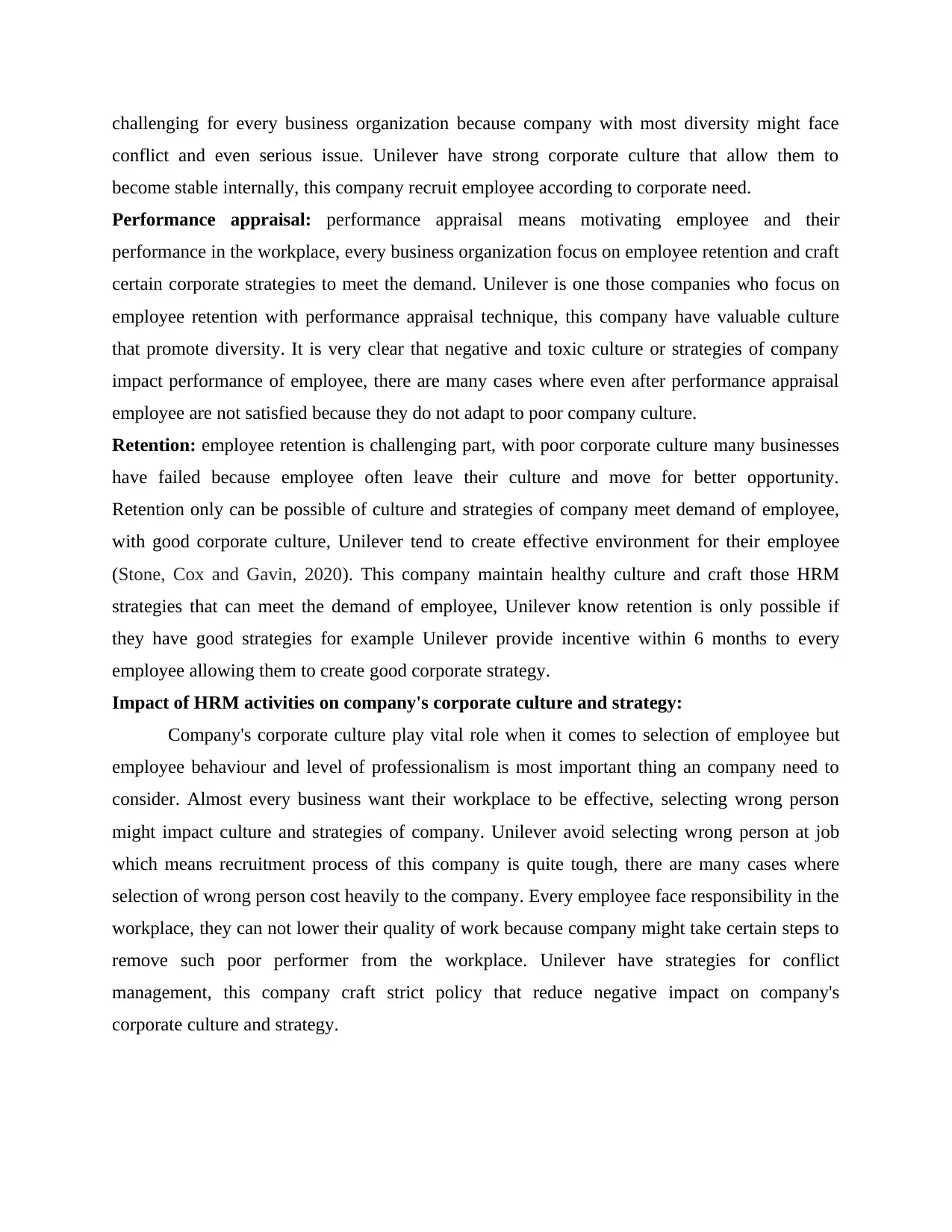
challenging for every business organization because company with most diversity might face
conflict and even serious issue. Unilever have strong corporate culture that allow them to
become stable internally, this company recruit employee according to corporate need.
Performance appraisal: performance appraisal means motivating employee and their
performance in the workplace, every business organization focus on employee retention and craft
certain corporate strategies to meet the demand. Unilever is one those companies who focus on
employee retention with performance appraisal technique, this company have valuable culture
that promote diversity. It is very clear that negative and toxic culture or strategies of company
impact performance of employee, there are many cases where even after performance appraisal
employee are not satisfied because they do not adapt to poor company culture.
Retention: employee retention is challenging part, with poor corporate culture many businesses
have failed because employee often leave their culture and move for better opportunity.
Retention only can be possible of culture and strategies of company meet demand of employee,
with good corporate culture, Unilever tend to create effective environment for their employee
(Stone, Cox and Gavin, 2020). This company maintain healthy culture and craft those HRM
strategies that can meet the demand of employee, Unilever know retention is only possible if
they have good strategies for example Unilever provide incentive within 6 months to every
employee allowing them to create good corporate strategy.
Impact of HRM activities on company's corporate culture and strategy:
Company's corporate culture play vital role when it comes to selection of employee but
employee behaviour and level of professionalism is most important thing an company need to
consider. Almost every business want their workplace to be effective, selecting wrong person
might impact culture and strategies of company. Unilever avoid selecting wrong person at job
which means recruitment process of this company is quite tough, there are many cases where
selection of wrong person cost heavily to the company. Every employee face responsibility in the
workplace, they can not lower their quality of work because company might take certain steps to
remove such poor performer from the workplace. Unilever have strategies for conflict
management, this company craft strict policy that reduce negative impact on company's
corporate culture and strategy.
conflict and even serious issue. Unilever have strong corporate culture that allow them to
become stable internally, this company recruit employee according to corporate need.
Performance appraisal: performance appraisal means motivating employee and their
performance in the workplace, every business organization focus on employee retention and craft
certain corporate strategies to meet the demand. Unilever is one those companies who focus on
employee retention with performance appraisal technique, this company have valuable culture
that promote diversity. It is very clear that negative and toxic culture or strategies of company
impact performance of employee, there are many cases where even after performance appraisal
employee are not satisfied because they do not adapt to poor company culture.
Retention: employee retention is challenging part, with poor corporate culture many businesses
have failed because employee often leave their culture and move for better opportunity.
Retention only can be possible of culture and strategies of company meet demand of employee,
with good corporate culture, Unilever tend to create effective environment for their employee
(Stone, Cox and Gavin, 2020). This company maintain healthy culture and craft those HRM
strategies that can meet the demand of employee, Unilever know retention is only possible if
they have good strategies for example Unilever provide incentive within 6 months to every
employee allowing them to create good corporate strategy.
Impact of HRM activities on company's corporate culture and strategy:
Company's corporate culture play vital role when it comes to selection of employee but
employee behaviour and level of professionalism is most important thing an company need to
consider. Almost every business want their workplace to be effective, selecting wrong person
might impact culture and strategies of company. Unilever avoid selecting wrong person at job
which means recruitment process of this company is quite tough, there are many cases where
selection of wrong person cost heavily to the company. Every employee face responsibility in the
workplace, they can not lower their quality of work because company might take certain steps to
remove such poor performer from the workplace. Unilever have strategies for conflict
management, this company craft strict policy that reduce negative impact on company's
corporate culture and strategy.
⊘ This is a preview!⊘
Do you want full access?
Subscribe today to unlock all pages.

Trusted by 1+ million students worldwide
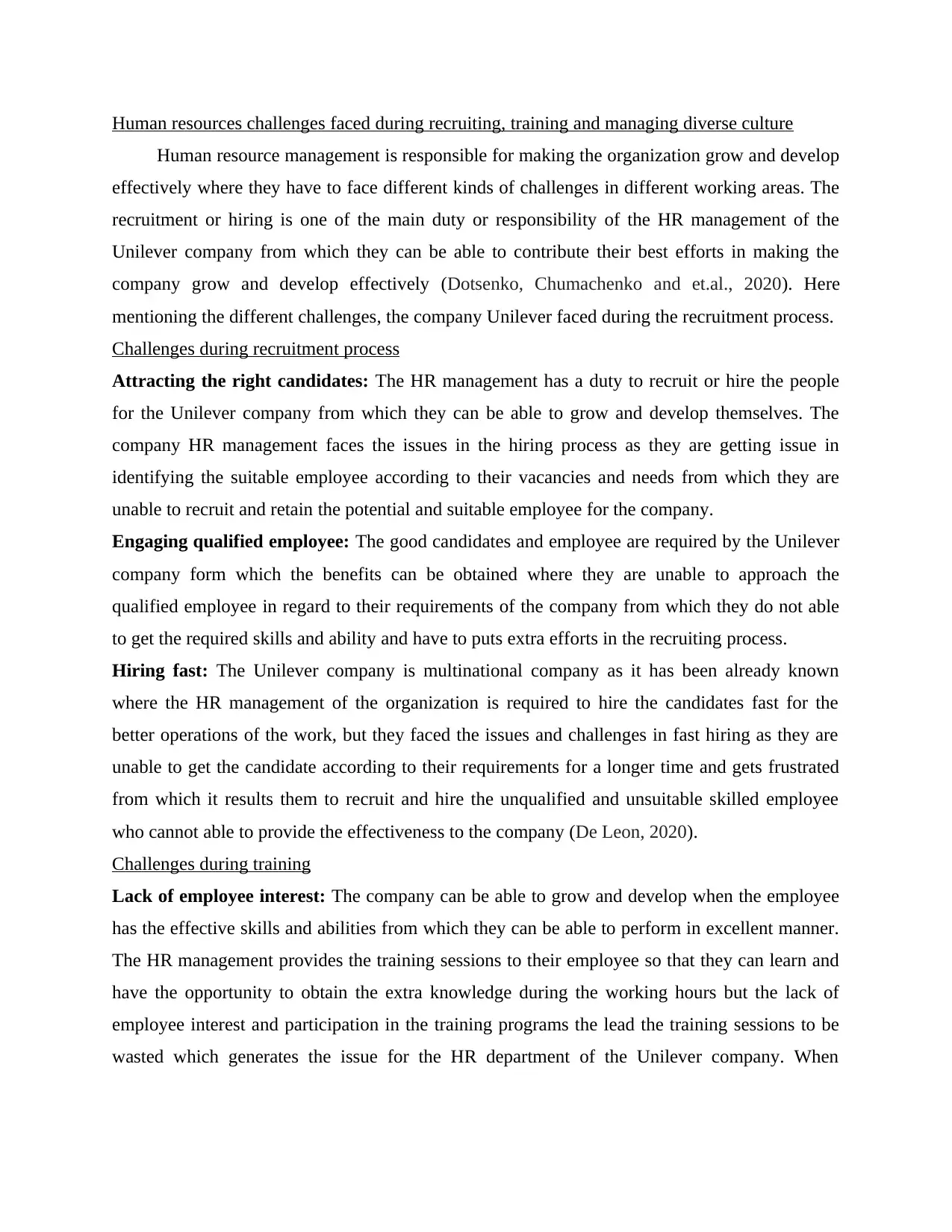
Human resources challenges faced during recruiting, training and managing diverse culture
Human resource management is responsible for making the organization grow and develop
effectively where they have to face different kinds of challenges in different working areas. The
recruitment or hiring is one of the main duty or responsibility of the HR management of the
Unilever company from which they can be able to contribute their best efforts in making the
company grow and develop effectively (Dotsenko, Chumachenko and et.al., 2020). Here
mentioning the different challenges, the company Unilever faced during the recruitment process.
Challenges during recruitment process
Attracting the right candidates: The HR management has a duty to recruit or hire the people
for the Unilever company from which they can be able to grow and develop themselves. The
company HR management faces the issues in the hiring process as they are getting issue in
identifying the suitable employee according to their vacancies and needs from which they are
unable to recruit and retain the potential and suitable employee for the company.
Engaging qualified employee: The good candidates and employee are required by the Unilever
company form which the benefits can be obtained where they are unable to approach the
qualified employee in regard to their requirements of the company from which they do not able
to get the required skills and ability and have to puts extra efforts in the recruiting process.
Hiring fast: The Unilever company is multinational company as it has been already known
where the HR management of the organization is required to hire the candidates fast for the
better operations of the work, but they faced the issues and challenges in fast hiring as they are
unable to get the candidate according to their requirements for a longer time and gets frustrated
from which it results them to recruit and hire the unqualified and unsuitable skilled employee
who cannot able to provide the effectiveness to the company (De Leon, 2020).
Challenges during training
Lack of employee interest: The company can be able to grow and develop when the employee
has the effective skills and abilities from which they can be able to perform in excellent manner.
The HR management provides the training sessions to their employee so that they can learn and
have the opportunity to obtain the extra knowledge during the working hours but the lack of
employee interest and participation in the training programs the lead the training sessions to be
wasted which generates the issue for the HR department of the Unilever company. When
Human resource management is responsible for making the organization grow and develop
effectively where they have to face different kinds of challenges in different working areas. The
recruitment or hiring is one of the main duty or responsibility of the HR management of the
Unilever company from which they can be able to contribute their best efforts in making the
company grow and develop effectively (Dotsenko, Chumachenko and et.al., 2020). Here
mentioning the different challenges, the company Unilever faced during the recruitment process.
Challenges during recruitment process
Attracting the right candidates: The HR management has a duty to recruit or hire the people
for the Unilever company from which they can be able to grow and develop themselves. The
company HR management faces the issues in the hiring process as they are getting issue in
identifying the suitable employee according to their vacancies and needs from which they are
unable to recruit and retain the potential and suitable employee for the company.
Engaging qualified employee: The good candidates and employee are required by the Unilever
company form which the benefits can be obtained where they are unable to approach the
qualified employee in regard to their requirements of the company from which they do not able
to get the required skills and ability and have to puts extra efforts in the recruiting process.
Hiring fast: The Unilever company is multinational company as it has been already known
where the HR management of the organization is required to hire the candidates fast for the
better operations of the work, but they faced the issues and challenges in fast hiring as they are
unable to get the candidate according to their requirements for a longer time and gets frustrated
from which it results them to recruit and hire the unqualified and unsuitable skilled employee
who cannot able to provide the effectiveness to the company (De Leon, 2020).
Challenges during training
Lack of employee interest: The company can be able to grow and develop when the employee
has the effective skills and abilities from which they can be able to perform in excellent manner.
The HR management provides the training sessions to their employee so that they can learn and
have the opportunity to obtain the extra knowledge during the working hours but the lack of
employee interest and participation in the training programs the lead the training sessions to be
wasted which generates the issue for the HR department of the Unilever company. When
Paraphrase This Document
Need a fresh take? Get an instant paraphrase of this document with our AI Paraphraser
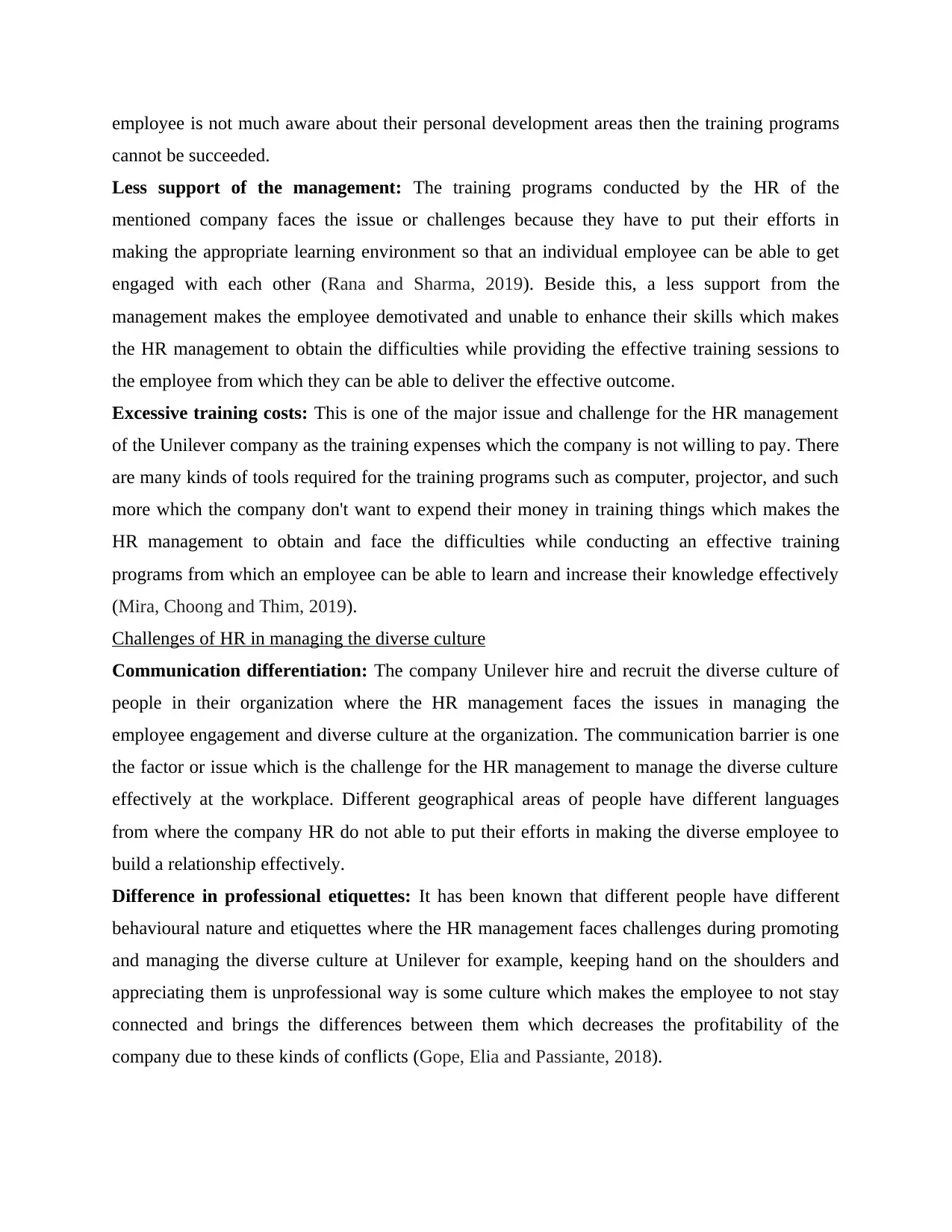
employee is not much aware about their personal development areas then the training programs
cannot be succeeded.
Less support of the management: The training programs conducted by the HR of the
mentioned company faces the issue or challenges because they have to put their efforts in
making the appropriate learning environment so that an individual employee can be able to get
engaged with each other (Rana and Sharma, 2019). Beside this, a less support from the
management makes the employee demotivated and unable to enhance their skills which makes
the HR management to obtain the difficulties while providing the effective training sessions to
the employee from which they can be able to deliver the effective outcome.
Excessive training costs: This is one of the major issue and challenge for the HR management
of the Unilever company as the training expenses which the company is not willing to pay. There
are many kinds of tools required for the training programs such as computer, projector, and such
more which the company don't want to expend their money in training things which makes the
HR management to obtain and face the difficulties while conducting an effective training
programs from which an employee can be able to learn and increase their knowledge effectively
(Mira, Choong and Thim, 2019).
Challenges of HR in managing the diverse culture
Communication differentiation: The company Unilever hire and recruit the diverse culture of
people in their organization where the HR management faces the issues in managing the
employee engagement and diverse culture at the organization. The communication barrier is one
the factor or issue which is the challenge for the HR management to manage the diverse culture
effectively at the workplace. Different geographical areas of people have different languages
from where the company HR do not able to put their efforts in making the diverse employee to
build a relationship effectively.
Difference in professional etiquettes: It has been known that different people have different
behavioural nature and etiquettes where the HR management faces challenges during promoting
and managing the diverse culture at Unilever for example, keeping hand on the shoulders and
appreciating them is unprofessional way is some culture which makes the employee to not stay
connected and brings the differences between them which decreases the profitability of the
company due to these kinds of conflicts (Gope, Elia and Passiante, 2018).
cannot be succeeded.
Less support of the management: The training programs conducted by the HR of the
mentioned company faces the issue or challenges because they have to put their efforts in
making the appropriate learning environment so that an individual employee can be able to get
engaged with each other (Rana and Sharma, 2019). Beside this, a less support from the
management makes the employee demotivated and unable to enhance their skills which makes
the HR management to obtain the difficulties while providing the effective training sessions to
the employee from which they can be able to deliver the effective outcome.
Excessive training costs: This is one of the major issue and challenge for the HR management
of the Unilever company as the training expenses which the company is not willing to pay. There
are many kinds of tools required for the training programs such as computer, projector, and such
more which the company don't want to expend their money in training things which makes the
HR management to obtain and face the difficulties while conducting an effective training
programs from which an employee can be able to learn and increase their knowledge effectively
(Mira, Choong and Thim, 2019).
Challenges of HR in managing the diverse culture
Communication differentiation: The company Unilever hire and recruit the diverse culture of
people in their organization where the HR management faces the issues in managing the
employee engagement and diverse culture at the organization. The communication barrier is one
the factor or issue which is the challenge for the HR management to manage the diverse culture
effectively at the workplace. Different geographical areas of people have different languages
from where the company HR do not able to put their efforts in making the diverse employee to
build a relationship effectively.
Difference in professional etiquettes: It has been known that different people have different
behavioural nature and etiquettes where the HR management faces challenges during promoting
and managing the diverse culture at Unilever for example, keeping hand on the shoulders and
appreciating them is unprofessional way is some culture which makes the employee to not stay
connected and brings the differences between them which decreases the profitability of the
company due to these kinds of conflicts (Gope, Elia and Passiante, 2018).
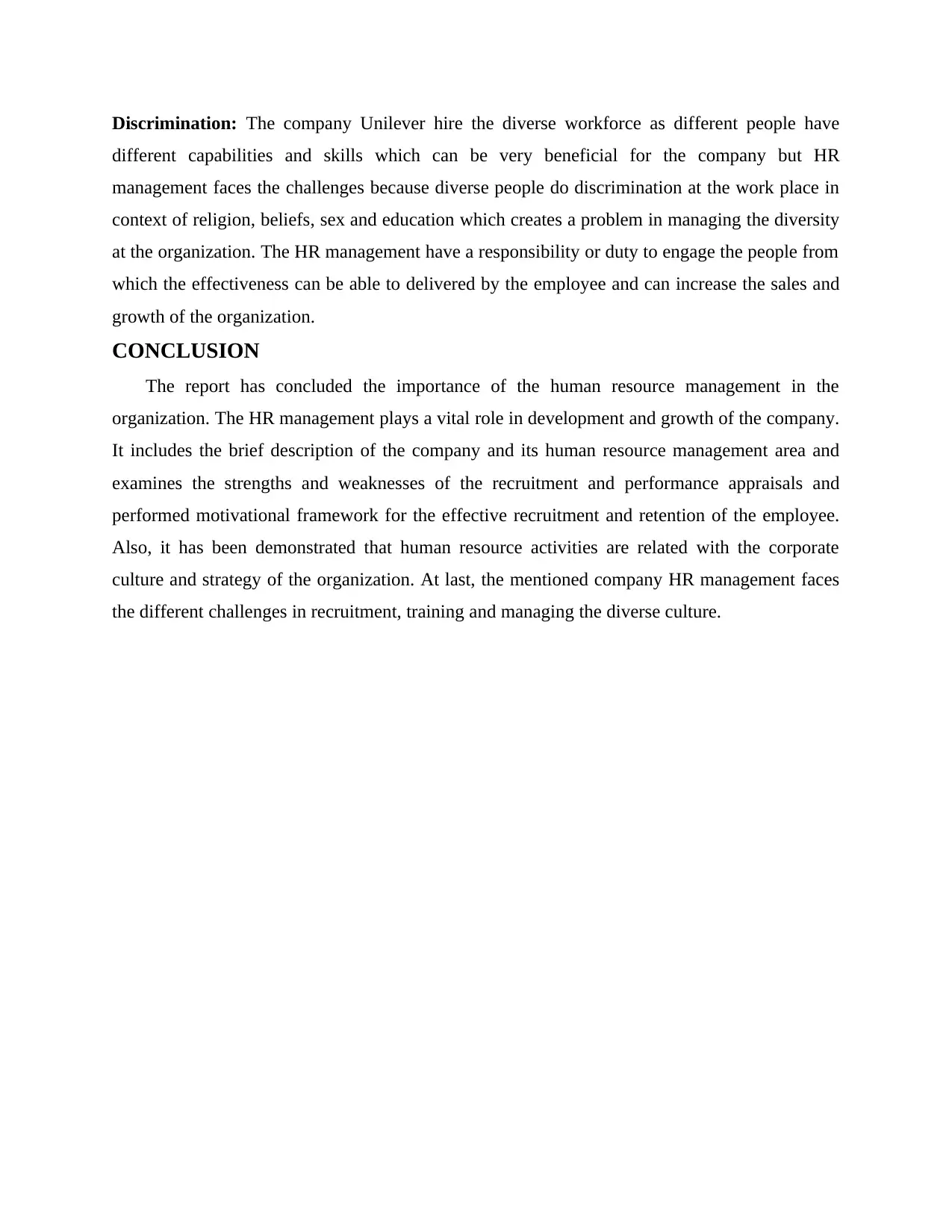
Discrimination: The company Unilever hire the diverse workforce as different people have
different capabilities and skills which can be very beneficial for the company but HR
management faces the challenges because diverse people do discrimination at the work place in
context of religion, beliefs, sex and education which creates a problem in managing the diversity
at the organization. The HR management have a responsibility or duty to engage the people from
which the effectiveness can be able to delivered by the employee and can increase the sales and
growth of the organization.
CONCLUSION
The report has concluded the importance of the human resource management in the
organization. The HR management plays a vital role in development and growth of the company.
It includes the brief description of the company and its human resource management area and
examines the strengths and weaknesses of the recruitment and performance appraisals and
performed motivational framework for the effective recruitment and retention of the employee.
Also, it has been demonstrated that human resource activities are related with the corporate
culture and strategy of the organization. At last, the mentioned company HR management faces
the different challenges in recruitment, training and managing the diverse culture.
different capabilities and skills which can be very beneficial for the company but HR
management faces the challenges because diverse people do discrimination at the work place in
context of religion, beliefs, sex and education which creates a problem in managing the diversity
at the organization. The HR management have a responsibility or duty to engage the people from
which the effectiveness can be able to delivered by the employee and can increase the sales and
growth of the organization.
CONCLUSION
The report has concluded the importance of the human resource management in the
organization. The HR management plays a vital role in development and growth of the company.
It includes the brief description of the company and its human resource management area and
examines the strengths and weaknesses of the recruitment and performance appraisals and
performed motivational framework for the effective recruitment and retention of the employee.
Also, it has been demonstrated that human resource activities are related with the corporate
culture and strategy of the organization. At last, the mentioned company HR management faces
the different challenges in recruitment, training and managing the diverse culture.
⊘ This is a preview!⊘
Do you want full access?
Subscribe today to unlock all pages.

Trusted by 1+ million students worldwide
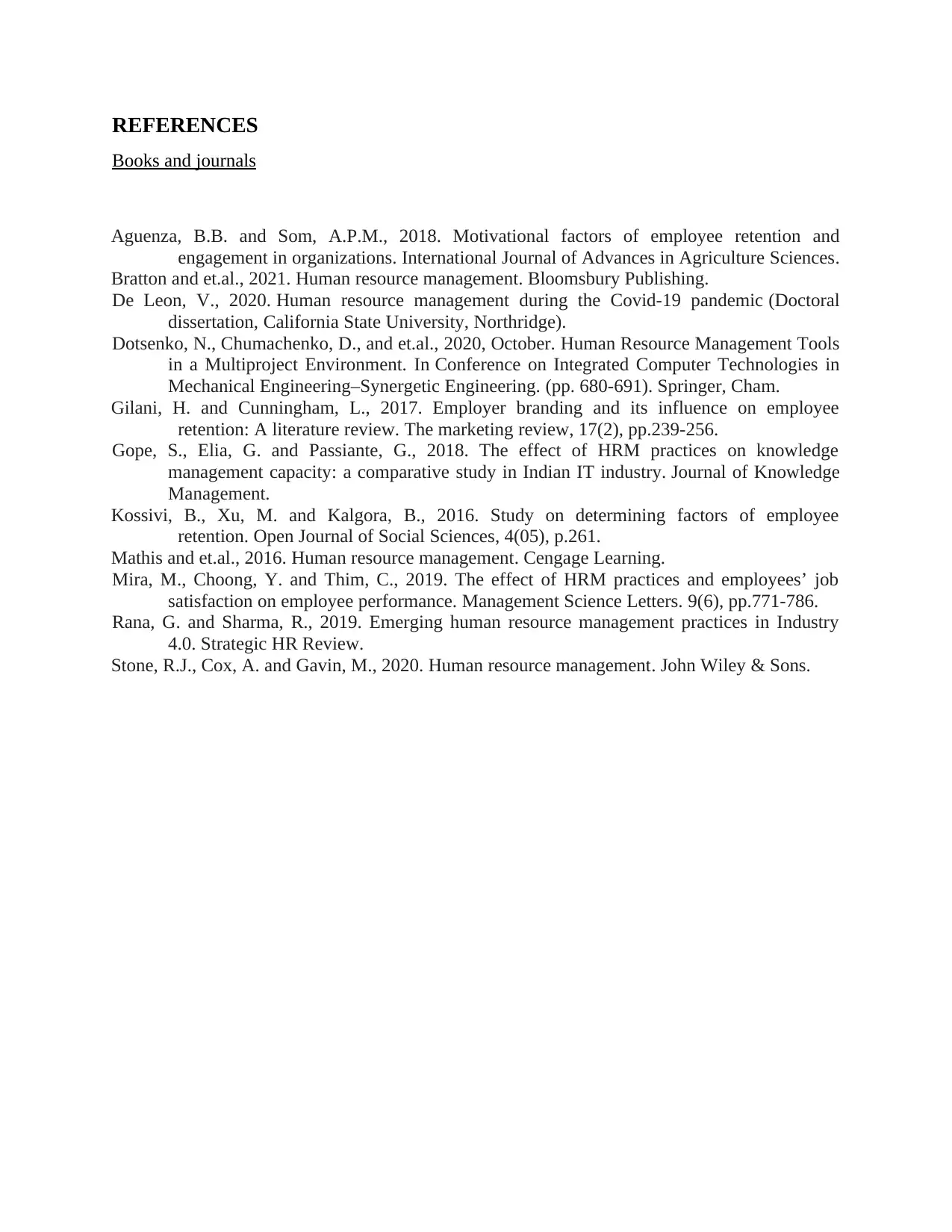
REFERENCES
Books and journals
Aguenza, B.B. and Som, A.P.M., 2018. Motivational factors of employee retention and
engagement in organizations. International Journal of Advances in Agriculture Sciences.
Bratton and et.al., 2021. Human resource management. Bloomsbury Publishing.
De Leon, V., 2020. Human resource management during the Covid-19 pandemic (Doctoral
dissertation, California State University, Northridge).
Dotsenko, N., Chumachenko, D., and et.al., 2020, October. Human Resource Management Tools
in a Multiproject Environment. In Conference on Integrated Computer Technologies in
Mechanical Engineering–Synergetic Engineering. (pp. 680-691). Springer, Cham.
Gilani, H. and Cunningham, L., 2017. Employer branding and its influence on employee
retention: A literature review. The marketing review, 17(2), pp.239-256.
Gope, S., Elia, G. and Passiante, G., 2018. The effect of HRM practices on knowledge
management capacity: a comparative study in Indian IT industry. Journal of Knowledge
Management.
Kossivi, B., Xu, M. and Kalgora, B., 2016. Study on determining factors of employee
retention. Open Journal of Social Sciences, 4(05), p.261.
Mathis and et.al., 2016. Human resource management. Cengage Learning.
Mira, M., Choong, Y. and Thim, C., 2019. The effect of HRM practices and employees’ job
satisfaction on employee performance. Management Science Letters. 9(6), pp.771-786.
Rana, G. and Sharma, R., 2019. Emerging human resource management practices in Industry
4.0. Strategic HR Review.
Stone, R.J., Cox, A. and Gavin, M., 2020. Human resource management. John Wiley & Sons.
Books and journals
Aguenza, B.B. and Som, A.P.M., 2018. Motivational factors of employee retention and
engagement in organizations. International Journal of Advances in Agriculture Sciences.
Bratton and et.al., 2021. Human resource management. Bloomsbury Publishing.
De Leon, V., 2020. Human resource management during the Covid-19 pandemic (Doctoral
dissertation, California State University, Northridge).
Dotsenko, N., Chumachenko, D., and et.al., 2020, October. Human Resource Management Tools
in a Multiproject Environment. In Conference on Integrated Computer Technologies in
Mechanical Engineering–Synergetic Engineering. (pp. 680-691). Springer, Cham.
Gilani, H. and Cunningham, L., 2017. Employer branding and its influence on employee
retention: A literature review. The marketing review, 17(2), pp.239-256.
Gope, S., Elia, G. and Passiante, G., 2018. The effect of HRM practices on knowledge
management capacity: a comparative study in Indian IT industry. Journal of Knowledge
Management.
Kossivi, B., Xu, M. and Kalgora, B., 2016. Study on determining factors of employee
retention. Open Journal of Social Sciences, 4(05), p.261.
Mathis and et.al., 2016. Human resource management. Cengage Learning.
Mira, M., Choong, Y. and Thim, C., 2019. The effect of HRM practices and employees’ job
satisfaction on employee performance. Management Science Letters. 9(6), pp.771-786.
Rana, G. and Sharma, R., 2019. Emerging human resource management practices in Industry
4.0. Strategic HR Review.
Stone, R.J., Cox, A. and Gavin, M., 2020. Human resource management. John Wiley & Sons.
1 out of 10
Related Documents
Your All-in-One AI-Powered Toolkit for Academic Success.
+13062052269
info@desklib.com
Available 24*7 on WhatsApp / Email
![[object Object]](/_next/static/media/star-bottom.7253800d.svg)
Unlock your academic potential
Copyright © 2020–2026 A2Z Services. All Rights Reserved. Developed and managed by ZUCOL.





